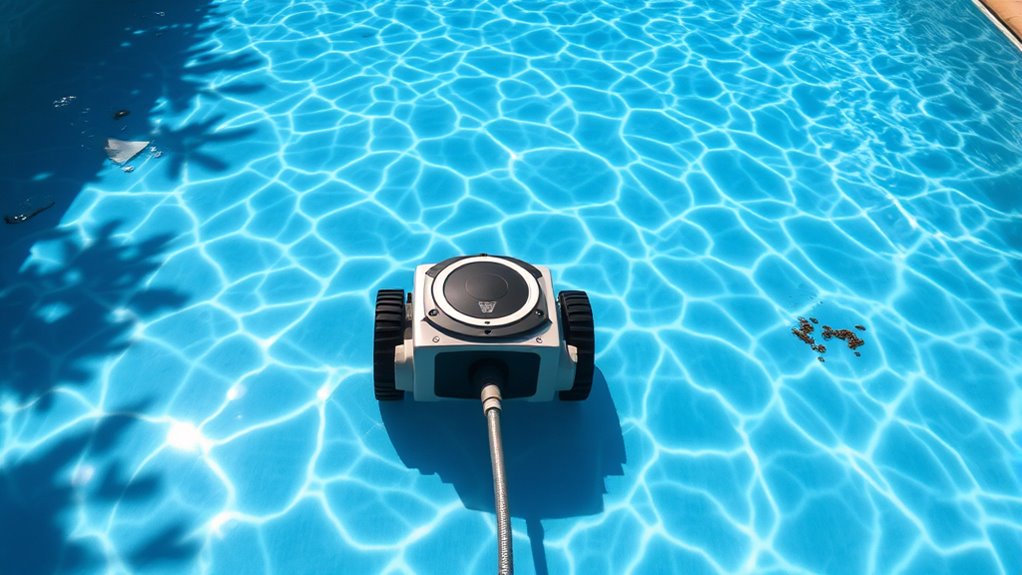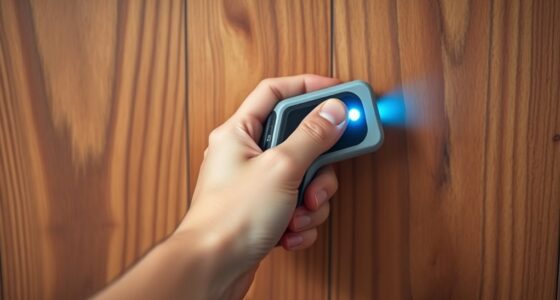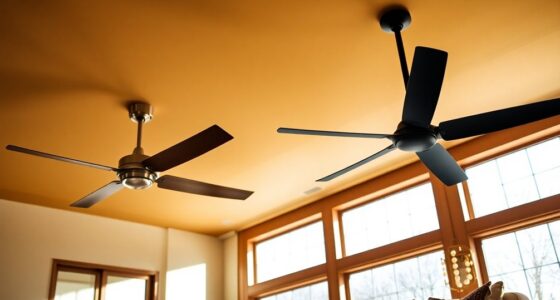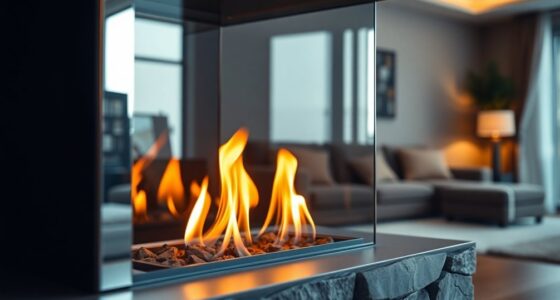Pressure pool cleaners are great for providing strong suction and thorough cleaning, especially for larger or in-ground pools, with easy setups and automation options. They efficiently remove debris and improve water circulation but can be bulky, noisy, and may struggle with tight corners. Regular maintenance is essential to prevent damage and keep them working well, and energy costs can add up if used frequently. Want to find out if they suit your pool and budget? Keep exploring for more details.
Key Takeaways
- Pressure pool cleaners effectively cover large areas and handle debris like leaves and algae with strong suction power.
- They are easy to install, operate, and compatible with most pool types, making maintenance straightforward.
- These cleaners can be bulky, noisy, and may struggle to reach tight corners or complex pool shapes.
- Long-term costs include potential expenses for repairs, parts, and higher energy consumption.
- Proper maintenance is essential to prevent equipment failure and optimize cleaning performance.
Efficiency and Cleaning Power
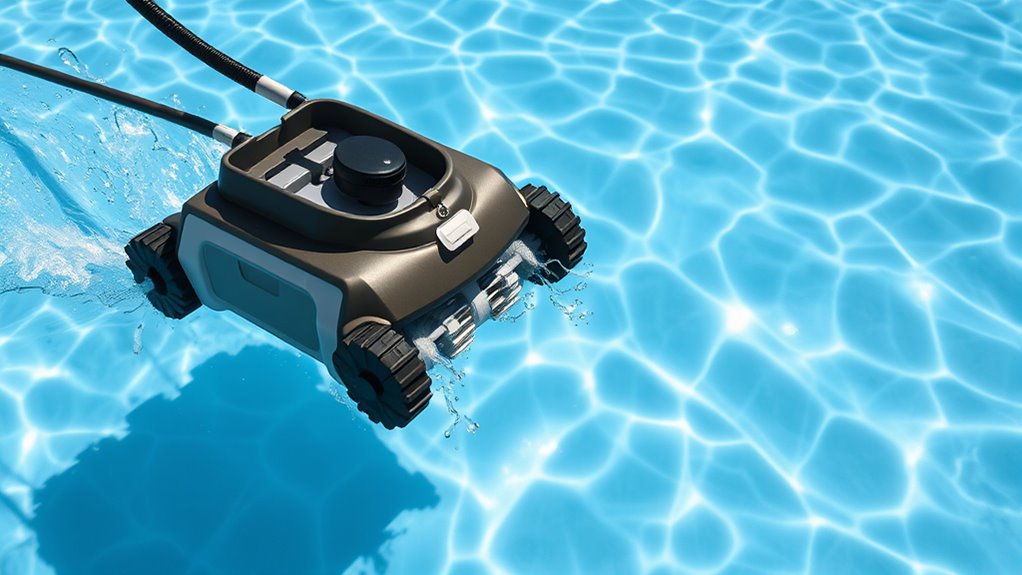
Pressure pool cleaners are known for their impressive efficiency and powerful cleaning capabilities. They excel at water circulation, ensuring the entire pool surface gets cleaned thoroughly. As water flows through the cleaner, it creates strong suction that pulls in debris from the pool floor and walls. This enhanced water circulation helps prevent dirt from settling and keeps your pool sparkling. Their powerful suction also improves debris removal, even for stubborn leaves, twigs, and algae. Because of their design, they can cover large areas quickly, making them ideal for bigger pools. You’ll notice your pool stays cleaner longer, reducing the need for manual vacuuming. Overall, pressure pool cleaners deliver excellent cleaning power by maximizing water circulation and debris removal, saving you time and effort. Additionally, their operation relies on automation technology to optimize cleaning patterns and efficiency. Proper maintenance of filter systems can further enhance their performance and longevity. Regularly inspecting the hoses and connections can help prevent leaks and ensure peak operation. Performing routine filter cleaning can also help prevent clogs and maintain optimal water flow.
Ease of Use and Convenience
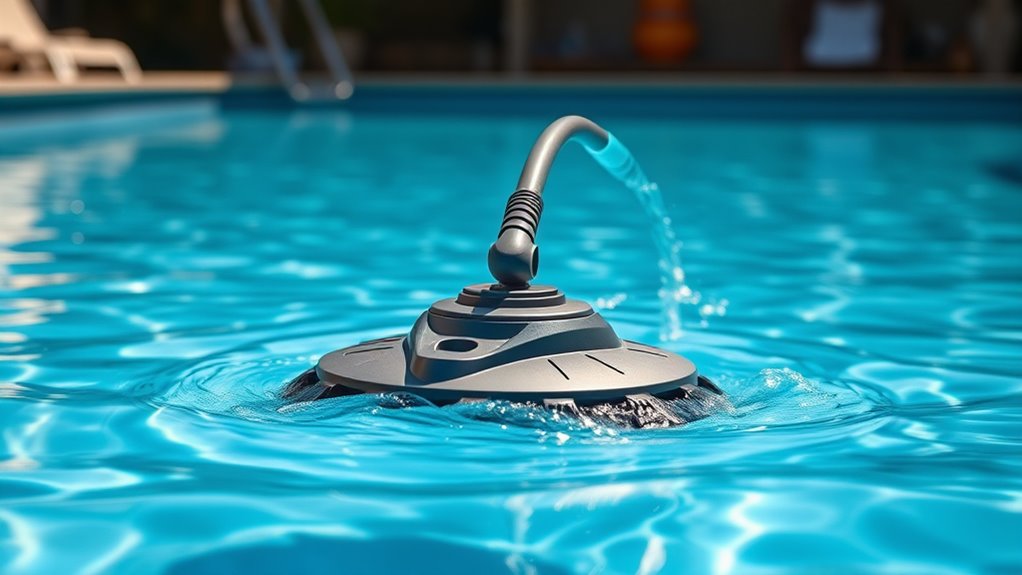
Pressure pool cleaners are designed to be user-friendly, starting with simple setup steps that don’t take much time. Their effortless operation features mean you can let them work with minimal supervision, saving you effort. Plus, quick maintenance routines keep the cleaner ready to go without hassle, making pool cleaning more convenient overall. Additionally, understanding proper maintenance routines can extend the lifespan of your cleaner and ensure optimal performance. Incorporating cleaner parts checks into your routine can further prevent common issues and improve efficiency.
Simple Setup Process
Setting up a pressure pool cleaner is straightforward and hassle-free, making it a convenient choice for pool owners. The process usually involves connecting hoses, attaching the cleaner to your skimmer or dedicated line, and adjusting the pressure. This simplicity minimizes installation challenges and guarantees you spend less time troubleshooting. Plus, the clear instructions help prioritize user safety during setup. Additionally, the Mazda Tuning concepts of simple upgrades and streamlined processes highlight how user-friendly installation procedures enhance overall satisfaction. Key points include: – No special tools required – Quick connection to existing equipment – Minimal steps for assembly – Clear user instructions – Safe handling during installation Because the process is simple, you avoid complex procedures that could lead to mistakes or safety issues. This ease of setup makes pressure cleaners accessible even for first-time pool owners, especially when proper installation techniques are followed. Incorporating user-friendly design principles can further streamline the process and improve the overall experience. Moreover, understanding pressure regulation can help optimize cleaning efficiency and prevent potential damage during setup. Additionally, a clear understanding of maintenance requirements ensures the cleaner remains effective over time and reduces long-term costs.
Effortless Operation Features
Because of their simple design, pressure pool cleaners offer effortless operation features that make maintaining your pool convenient. With manual control, you can easily direct the cleaner’s movements or stop it when needed, giving you quick adjustments without hassle. These cleaners are designed for straightforward use, so manual cleaning tasks are minimal. You won’t need complex programs or extensive setup; instead, they work automatically once connected to the hose and pump. Their intuitive operation means you spend less time supervising and more time enjoying your pool. Plus, their minimal fuss makes routine cleaning feel less like a chore. Additionally, understanding how air quality impacts health can help you maintain a healthier environment around your pool area. Incorporating insights from sound healing science can also promote relaxation and well-being after cleaning sessions. Overall, their ease of use guarantees that keeping your pool clean remains simple and stress-free, even if you prefer occasional manual control over automated functions. Maintaining proper water chemistry is also essential to ensure optimal cleaning results and prevent issues like algae buildup.
Quick Maintenance Routine
With their straightforward design, pressure pool cleaners enable you to perform quick and hassle-free maintenance routines. You can easily keep your pool clean without complex setups, saving time and effort. Regularly checking the chemical balance helps guarantee the cleaner operates efficiently, while monitoring water temperature prevents damage to the system. To streamline maintenance, consider these tips:
- Regularly inspect and clean the filter
- Adjust pressure levels for peak performance
- Maintain proper chemical balance to prevent buildup
- Keep water temperature within recommended ranges
- Remove debris from skimmer and pump baskets before cleaning
Being aware of electric power generation methods can also help you understand how alternative energy sources might impact pool equipment efficiency. Understanding couples’ relationship dynamics can be relevant for those maintaining shared spaces like pools, as harmony in relationships often promotes a peaceful environment. Maintaining quality assurance practices in your pool care routine ensures the longevity and optimal operation of your equipment. This simple routine keeps your pool sparkling and extends the cleaner’s lifespan, making maintenance less of a chore and more of a quick task. Incorporating energy-efficient solar power systems can further enhance your pool’s sustainability and reduce operational costs.
Cost and Maintenance Expenses
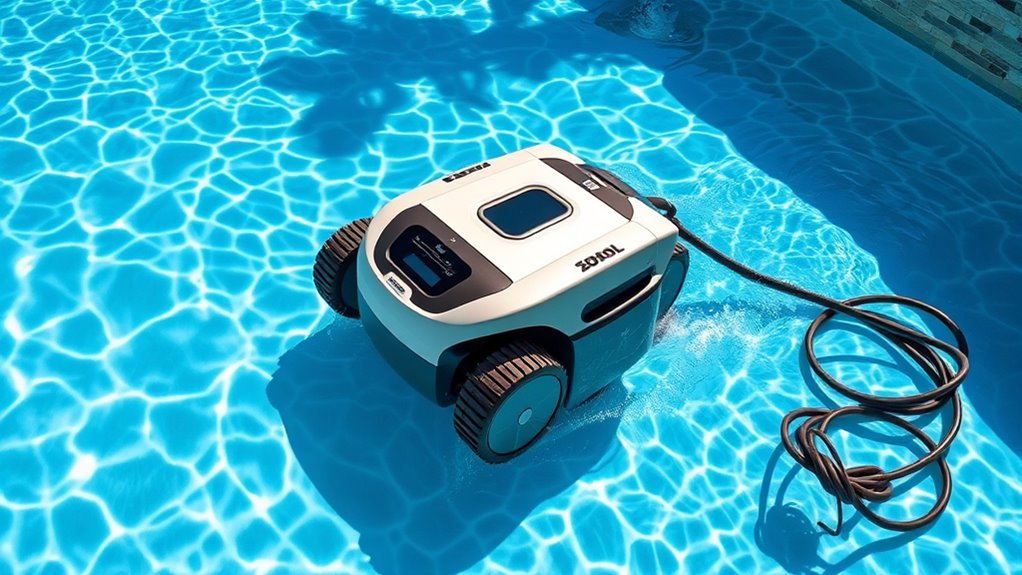
When considering pressure pool cleaners, you’ll want to look at the initial purchase price and how much you’ll spend on operation and energy over time. These costs can add up, especially if the cleaner runs frequently or uses a lot of power. Additionally, don’t forget to factor in long-term maintenance fees that may be needed to keep the cleaner running smoothly. Proper air purifier maintenance can extend the lifespan of your equipment and prevent costly repairs. Regularly inspecting and cleaning your equipment can also help identify potential issues early, reducing the likelihood of unexpected expenses. Understanding payment processing systems can help you manage your equipment purchases and service payments efficiently. Being aware of cost management techniques can further optimize your investment and minimize unforeseen costs.
Initial Purchase Price
Pressure pool cleaners generally come with a higher initial purchase price compared to manual skimmers or robotic models, but their cost can vary based on features and brand. The upfront investment depends on factors like brand reputation and warranty coverage, which can impact long-term savings. Cheaper models may lack durability or reliable customer support, so investing in well-known brands often pays off. Consider these points:
- Higher-quality brands tend to offer better warranty coverage.
- Premium models include advanced features that justify the price.
- Cheaper options might save money initially but could require more repairs.
- Brand reputation influences product longevity.
- Warranty coverage can reduce future repair costs.
- Additionally, the quality of the sprayer plays a crucial role in ensuring long-term efficiency and performance. Investing in reliable components can prevent frequent malfunctions and extend the cleaner’s lifespan. Regular maintenance and proper cleaning of the filtration system also contribute to the overall durability of the pressure cleaner.
Your choice should balance initial cost with trusted brand reputation and solid warranty coverage to ensure lasting value.
Operating and Energy Costs
Operating and energy costs for pressure pool cleaners can vary markedly based on their design and usage. You’ll find that these cleaners consume different amounts of energy depending on how often you run them and their efficiency. Maintaining proper chemical balance is essential, as imbalanced water can cause the cleaner to work harder, increasing energy use. Additionally, water circulation plays a key role; well-maintained circulation systems help the cleaner operate smoothly, reducing energy consumption. Regularly checking and adjusting chemicals ensures ideal water quality, preventing strain on the cleaner. While pressure pool cleaners generally use less energy than some other types, frequent use or poor water conditions can drive up operating costs. Staying on top of water chemistry and circulation helps keep your energy bills manageable.
Long-term Maintenance Fees
Long-term maintenance fees for pressure pool cleaners can add up over time, impacting your overall pool budget. Regular upkeep ensures the cleaner functions properly and maintains water chemistry, which is crucial for pool safety. Over time, you might need to replace parts like filters or hoses, increasing costs. Poor maintenance can lead to equipment failure, risking imbalanced water chemistry and unsafe swimming conditions. To keep expenses manageable, consider:
- Regularly inspecting and cleaning parts
- Using compatible replacement components
- Monitoring water chemistry frequently
- Scheduling professional check-ups
- Budgeting for unexpected repairs
Staying on top of these expenses helps prolong your cleaner’s lifespan and keeps your pool safe and clean without surprising costs. Proper maintenance minimizes the long-term financial impact and supports overall pool safety.
Compatibility With Pool Types
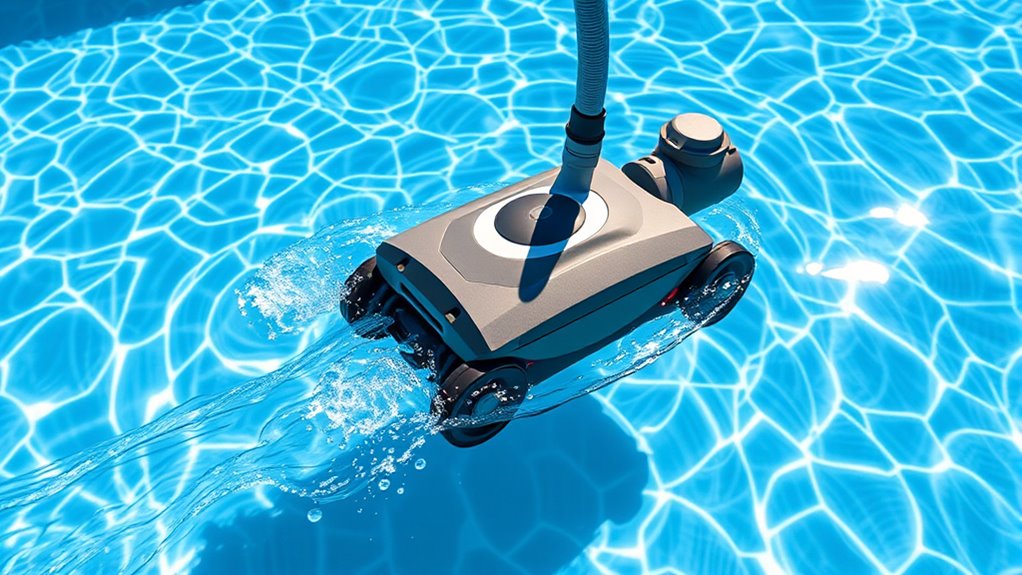
Not all pressure pool cleaners work equally well with every type of pool, so it’s important to contemplate compatibility before making a purchase. You should consider brand compatibility to guarantee the cleaner fits your pool’s existing equipment and features. For example, some brands are designed specifically for inground pools, while others work better with above-ground pools. Installation flexibility is also vital; a model that’s easy to set up and adapt to your pool’s shape and size saves you time and effort. Check if the cleaner can handle various pool surfaces, like vinyl, fiberglass, or tile, to avoid damage. By understanding your pool type and choosing a pressure cleaner that aligns with it, you guarantee optimal performance and longevity of both your pool and the cleaning device.
Potential Limitations and Drawbacks
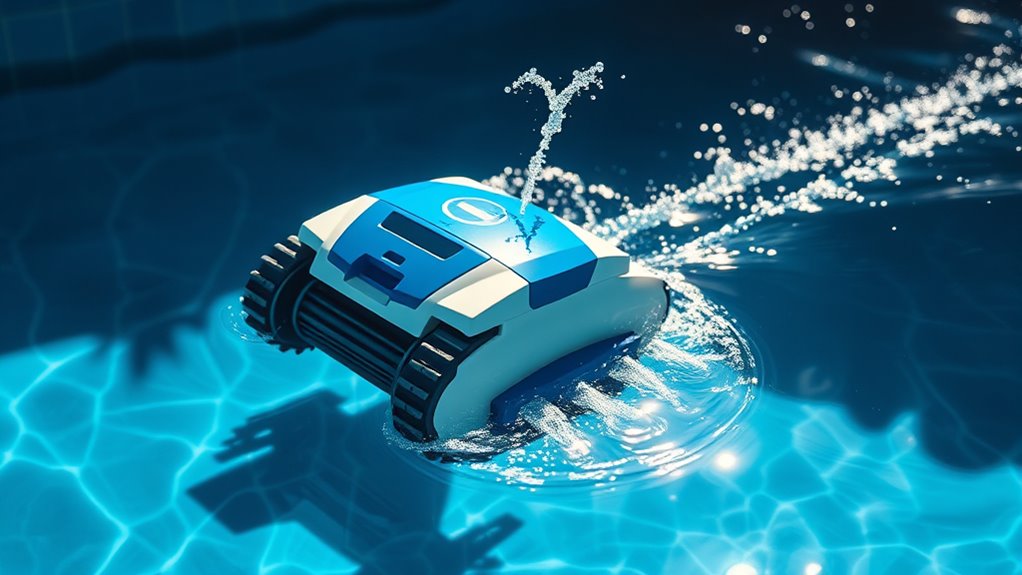
While selecting a pressure pool cleaner that fits your pool type is important, it’s equally essential to be aware of its potential limitations. These cleaners can sometimes have a complicated user interface, making setup and operation frustrating. They may also impact the aesthetic appeal of your pool area if they’re bulky or noisy. Additionally, pressure cleaners might miss certain debris or struggle with tight corners. You could find that they require frequent maintenance, increasing your time and costs. Furthermore, their effectiveness can vary depending on pool shape and size. Keep these limitations in mind to ensure you choose a cleaner that aligns with your expectations and pool environment.
- Complex user interface can hinder ease of use
- Bulky design may detract from aesthetic appeal
- Limited debris pick-up in tight corners
- Frequent maintenance needs increase costs
- Performance varies based on pool shape
Impact on Pool Equipment and Environment

Pressure pool cleaners can impact your pool equipment by increasing wear and tear on pumps and filters, especially if they operate at high pressure or generate excessive debris. This strain may lead to frequent repairs and downtime, affecting water circulation and overall pool health. Additionally, improper use can disturb your chemical balance, making it harder to maintain clean, safe water. Environmental concerns also arise if debris isn’t properly filtered or if excessive energy consumption occurs.
| Impact | Feel the Difference |
|---|---|
| Increased equipment stress | Frustration from costly repairs |
| Disrupted water circulation | Anxiety over poor water quality |
| Imbalanced chemicals | Worry about unsafe swimming conditions |
| Excessive debris buildup | Disappointment in pool appearance |
| Higher energy use | Guilt about environmental footprint |
Frequently Asked Questions
How Long Do Pressure Pool Cleaners Typically Last?
Pressure pool cleaners usually last around 3 to 5 years, depending on durability considerations. You’ll need to monitor their condition regularly and perform maintenance requirements like cleaning filters and inspecting hoses to extend their lifespan. Proper use and avoiding harsh chemicals can also help, ensuring you get the most out of your investment. Keep an eye on wear and tear so you can replace parts as needed, maximizing longevity.
Can Pressure Cleaners Handle Large Debris Effectively?
Imagine your pool filled with leaves, twigs, and larger debris floating on the surface. A pressure pool cleaner with strong suction power and ample debris capacity tackles these challenges effectively, pushing away big debris with ease. It’s designed to handle large debris, making cleanup quicker and more efficient. So, if your pool tends to gather substantial debris, a pressure cleaner can be a reliable choice to keep your water pristine.
Do Pressure Pool Cleaners Require Professional Installation?
You don’t need a professional to install pressure pool cleaners, as they’re usually easy to set up with basic pool maintenance knowledge. Just guarantee the equipment is compatible with your pool system and follow the manufacturer’s instructions. Most models connect directly to your skimmer or dedicated return line, making installation straightforward. With proper setup, you can enjoy efficient cleaning without extra help, saving you time and money.
Are Pressure Cleaners Suitable for Saltwater Pools?
You might wonder if pressure cleaners work well for saltwater pools. They can be suitable if they have saltwater compatibility and corrosion resistance. Look for models designed specifically for saltwater environments, as these are built to withstand corrosion from salt. With the right pressure cleaner, you’ll enjoy easier pool maintenance without worrying about damage, ensuring your pool stays clean and in good shape over time.
How Often Should I Replace Parts on a Pressure Cleaner?
Imagine your pressure pool cleaner as a trusted companion, needing care to stay loyal. You should check your maintenance schedule monthly and replace parts like brushes, hoses, and gears every 1-2 years, depending on usage. Regular inspections help prevent breakdowns, ensuring smooth operation. Keep an eye on wear and tear, and don’t delay replacements—this keeps your cleaner running efficiently and extends its lifespan.
Conclusion
Ultimately, choosing a pressure pool cleaner is like selecting the right tool for a delicate task—you need to weigh the pros and cons carefully. They can be powerful and convenient, but might also be costly or limited in compatibility. By considering your pool’s type and your maintenance preferences, you can find a cleaner that works best for you. With the right choice, maintaining your pool becomes as smooth as a well-choreographed dance.
